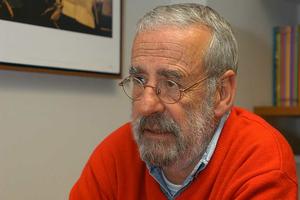Yesterday morning Colombia and Latin America lost one of its most influential intellectuals and social scientists: Álvaro Camacho Guizado, a colleague, mentor, and, above all, a very dear friend. I have known Álvaro since 1995 when I was a visiting scholar at the National University of Colombia. He dedicated his life and energy to the study of narco-trafficking. He was a respected professor at the University of Valle in Cali, Colombia, and later directed the Institute of Political Studies and International Relations at the National University of Colombia in Bogotá. From 2001 until his passing, he directed the Center of Sociocultural Studies at the Andes University, also in Bogotá.
 His sense of purpose and dedication to his work was unparalleled. His friends and colleagues used to joke about his probing and intensely combative spirit that also radiated attributes not common to intellectuals: passion and love. Camacho was deeply affected by the severe social inequalities and unending armed conflict in Colombia, and their ignominious ties to narco-trafficking. He was an early critic of U.S. anti-drug policy in Colombia, helping to uncover the futility and damaging effects of the "War on Drugs" in Colombia and the region.
His sense of purpose and dedication to his work was unparalleled. His friends and colleagues used to joke about his probing and intensely combative spirit that also radiated attributes not common to intellectuals: passion and love. Camacho was deeply affected by the severe social inequalities and unending armed conflict in Colombia, and their ignominious ties to narco-trafficking. He was an early critic of U.S. anti-drug policy in Colombia, helping to uncover the futility and damaging effects of the "War on Drugs" in Colombia and the region.
In a recent essay, entitled “Narco-trafficking: Mutations and Politics,” Camacho explained the adaptive capacity of the narco-trafficking industry. He attributed the resilience of narco-trafficking to its agency and enormous profits, which has produced non-hierarchical organizational structures. This, coupled with flexible strategies, has allowed the narco-trafficking industry to not only survive, but also to change, grow, and expand on a global scale. One key adaptive quality of the industry is the constant change in the division of labor among multiple criminal groups. The industry’s high profits, Camacho warned, act as “black hole” for the poor and marginalized, pulling the universe of the unemployed and the disenfranchised into this lucrative activity.
Álvaro, I will miss you very much. Rest in peace my dear friend.
Below is a short list of some of Camacho’s work:
-Álvaro Camacho Guizado (editor), Narcotrafico: Europa, Estados Unidos, America Latina (Universidad de Los Andes, 2006).
-Álvaro Camacho Guizado, Las Drogas: Una Guerra Fallida (Universidad Nacional de Colombia, 1999).
-Álvaro Camacho Guizado and Álvaro Guzmán Barney, Collecíon Ciudad y Democracia. Colombia, Ciudad y Violencia, (Ediciones Foro Nacional, 1990).
For more from Nazih Richani's blog, Colombian Cuadernos, visit nacla.org/blog/cuadernos-colombianos, or see the NACLA Report July/August 2009, "Coercion Incorporated: Paramilitary Colombia."

